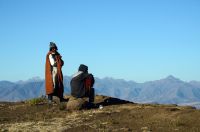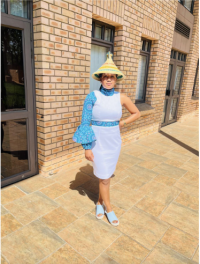“I am proud of what I am, of my country and people, our history and tradition, language, music and art and firmly believe that Africans have something distinct to offer to world culture.” – Nelson Mandela (1975).

Basotho ba re, “O tswa kae”. Ke arabe ke re, “Ke tswa ha Mantilatilane”. Ba re, “Wa jang?”. Ke arabe ke re, “Bohobe”. Ba re, “Wa futswela kang?” Ke arabe hape ke re, “Ka metsi a pula”. Ba kgutle ba re, “Thella heh ke utlwe.”
Ke re:
Ke thelleleng ke le Mofokeng wa Kgolokoane,
Wa Mmalekatsa la Makgabane,
La ikgoloka la ipeha kgorong, la re jang-jang kapele Mantsi ke ao.
The above is an illustration of how Basotho people introduce themselves connecting deeply with their heritage and ancestors. With that I say: Dumelang Bafokeng, Maphetla, Mapolane, Baphuthing, Bakgolokwe, Basia, Batlokwa, Bakwena, Batloung, Bahlakwana, Dihoja, Bataung, Batshweneng and people of other nations.
The Basotho people are the indigenous people of Lesotho and are also predominantly found in the Free State and former Transkei regions of South Africa. “Moshoeshoe the First welded together his own Sotho people with the refugees of the nations he defeated to establish the Basotho kingdom through the use of diplomacy and not through force or aggression. A popular praise poem dedicated to Moshoeshoe I is:
Ke nna Moshoeshoe Moshoashoaila wa ha Kali, (I am Moshoeshoe, Barber of Kali),
Lebeola le beotseng Ramonaheng ditedu; (Shaver who’s skinned off Ramonaheng’s beard);
Le ho hola, ha di eso hole, (And as for growing it hasn’t grown yet),
Di ya sala, di hola maisao. (It remains to grow in years to come).

This poem is also recited by Basotho people to distinguish themselves from other tribes. The philosophical nature of the Basotho people is characterized by a strong sense of community, respect for God and ancestors, harmony with nature, and an emphasis on wisdom and tradition. These elements come together to create a worldview that values collective well-being, spiritual depth, and cultural continuity. It also honours the foundation that Moshoeshoe I built for the nation when he stated that ‘Peace builds a nation’ (Kgotso e aha setjhaba).
These philosophical underpinnings shape the lives of the Basotho people. It is their umbilical cord that dictates their character, behaviour, and principles.
The Sotho language (Sesotho) is rich in proverbs, storytelling, and oral history, reflecting the values and wisdom of the Basotho people. We are known for our exceptional horsemanship, with skills passed down through generations, emphasising the bond between the horse and the rider. Often referred to as the blanket nation; the Seanamarena, Letlama, Kgotso and many other blankets symbolise fertility and growth. To us, music is medicine, and it is composed of Famo, Mokorotlo and Mangae with hip-hop beats making their way in through artists such as Ntate Stunna and Sannere. Despite modern influences, many of these cultural elements remain deeply rooted in everyday life and continue to foster a deep connection between the people and their land, traditions, and values.
On the 24th of September, Castle Milk Stout’s programme ‘AFRIKAREOKE’ aired an episode titled A Journey of Revival, on SABC 1 with Ntate Stunna and Yanga Chief highlighting the importance of preserving our Heritage and African songs.
As the saying goes: “Ha o se Mosotho, ke bohlasweng ba hao” (If you are not Sotho, it’s your own misfortune), and I could not agree more!
Kgotso! Pula! Nala! (Peace, rain, prosperity.)